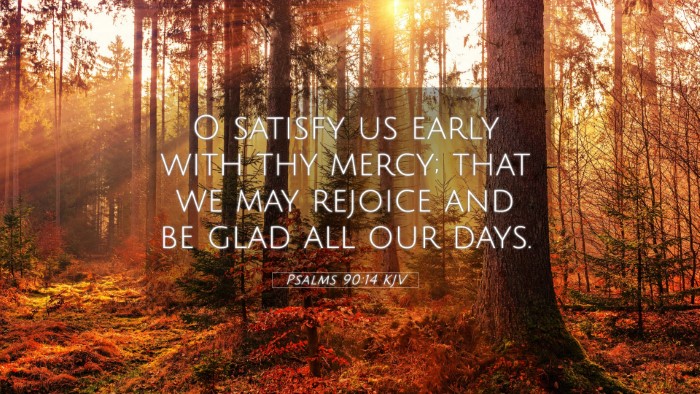Understanding Psalms 90:14
Psalms 90:14 reads: "O satisfy us early with thy mercy; that we may rejoice and be glad all our days." This verse is a poignant plea to God for His mercy and satisfaction. It reflects a deep desire for the assurance of God's enduring grace throughout our lives.
Meaning and Interpretation
The profound nature of this verse can be explored through the insights gathered from several public domain commentaries:
- Matthew Henry: Henry suggests that this verse expresses the soul's longing for early experiences of God's mercy. He emphasizes the notion that receiving God's mercy brings joy and fulfillment, enabling believers to carry a glad heart throughout their days. The concept of 'early' signifies an earnest desire for God's grace from the very beginning of each day.
- Albert Barnes: Barnes interprets that the petition for satisfaction with God's mercy is a recognition of human neediness. He connects this request to the overarching theme of dependence on God. Barnes points out that joy and gladness arise from the experience of God's merciful nature, signifying that true satisfaction comes from divine interaction.
- Adam Clarke: Clarke offers insights on the importance of recognizing the temporality of human life. He elaborates that the message in Psalms 90:14 is a reminder that recognition of God’s mercy leads to wisdom in living fully and effectively each day. Clarke encourages readers to actively seek and acknowledge God’s mercy to find genuine joy and satisfaction.
Thematic Connections
The themes of mercy, satisfaction, and joy in Psalms 90:14 resonate throughout Scripture, aligning with various other verses:
- Psalm 107:9: "For he satisfieth the longing soul, and filleth the hungry soul with goodness." This verse echoes the sentiment of divine satisfaction and God's readiness to fulfill our deepest needs.
- Isaiah 55:1: "Ho, every one that thirsteth, come ye to the waters..." This verse encourages seekers to turn to God for their thirst, highlighting the satisfaction that His mercy provides.
- 1 Corinthians 1:4: "I thank my God always on your behalf, for the grace of God which is given you by Jesus Christ." This demonstrates the New Testament understanding of receiving God’s grace as an assurance of joy and satisfaction.
- James 1:5: "If any of you lack wisdom, let him ask of God, that giveth to all men liberally, and upbraideth not; and it shall be given him." Here, the idea of seeking God early and wholeheartedly resonates with the request for mercy and fulfillment.
- Matthew 5:6: "Blessed are they which do hunger and thirst after righteousness: for they shall be filled." This beatitude connects the longing for divine satisfaction to blessings of fulfillment and joy.
- Romans 15:13: "Now the God of hope fill you with all joy and peace in believing, that ye may abound in hope, through the power of the Holy Ghost." This highlights the relationship between divine satisfaction and spiritual joy.
- Philippians 4:19: "But my God shall supply all your need according to his riches in glory by Christ Jesus." This emphasizes God’s provision and care, reinforcing the message of Psalms 90:14 about divine satisfaction.
Cross-Referencing Biblical Texts
This verse can be linked to a plethora of other biblical passages that reflect similar themes:
- Psalms 103:17-18: "But the mercy of the Lord is from everlasting to everlasting upon them that fear him, and his righteousness unto children's children." This speaks to God’s perpetual mercy for those who seek Him.
- 2 Corinthians 1:3-4: This passage refers to God as being the "Father of mercies" who comforts us in our tribulations, aligning with the desire for mercy in Psalms 90:14.
- Hebrews 4:16: "Let us therefore come boldly unto the throne of grace..." reinforces the idea of approaching God for mercy and grace to find help in times of need.
- Luke 1:50: “And his mercy is on them that fear him from generation to generation.” This reinforces the continuity of God’s mercy toward mankind.
- Psalm 30:5: “For his anger endureth but a moment; in his favor is life: weeping may endure for a night, but joy cometh in the morning.” This verse parallels the notion of receiving mercy leading to joy.
Practical Applications and Reflections
In light of Psalms 90:14, believers are encouraged to:
- Seek God's mercy daily: Approach each day with a heart open to receiving God's grace.
- Reflect on God’s blessings: Spend time acknowledging and celebrating the works of God in your life, fostering a mindset of gratitude.
- Share God’s mercy with others: As recipients of God’s mercy, we are called to extend grace and love to those around us.
- Live joyfully in God's presence: Allow the awareness of God's mercy to permeate all circumstances, encouraging a joyful existence.
Conclusion
Psalms 90:14 serves as a powerful reminder of the importance of seeking God’s mercy to find true satisfaction, joy, and gladness throughout life. By cross-referencing this verse with others, we uncover a rich tapestry of scripture that highlights the consistent theme of divine mercy and its profound impact on the believer's life.
Related Keywords and Concepts
In the context of this exploration, we recognize the importance of:
- Bible verse cross-references
- Connections between Bible verses
- Linking Bible scriptures to unlock deeper understanding
- Cross-referencing Biblical texts for enhanced interpretation
- Thematic Bible verse connections that unify scriptural themes














